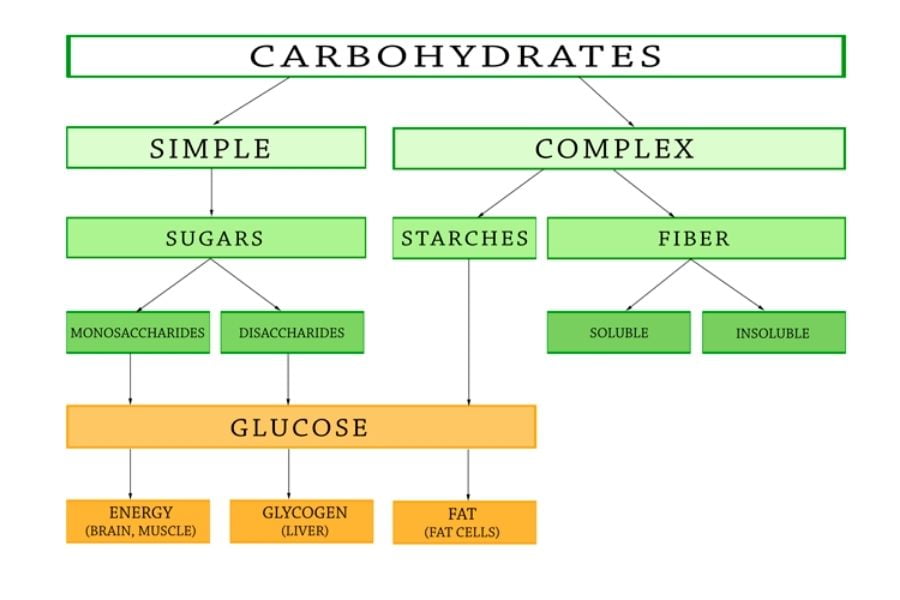Carbs or carbohydrates are one of the macronutrients that give your body energy in the form of calories. The body uses insulin to help carry the glucose to the cells. Carbohydrates are the body’s primary energy source and fuel for vital organs like kidneys, central nervous systems, and brains. When too many carbohydrates are eaten, the blood sugar level spikes, resulting in an insulin spike, causing weight gain. Therefore, how many carbs should one consume in a day to maintain a healthy body?
Different Types Of Carbs

- Complex carbohydrates are less processed, more slowly digested, and high in dietary fiber. Complex carbs are important for the body to work optimally.
- Simple carbohydrates are those that are digested more quickly. And are often added to processed and prepared foods in the form of refined sugars, etc.
- The carbs’ intake for a person every day varies according to their age, sex, body type, and activity levels.
History Of Carbs
Carbs had traveled from the extreme fat-phobia era (when growing up in the ’90s) to a fixation on the high-fat, low to the no-carb keto diet. The keto diet, used for epilepsy treatment, was introduced in the 1920s. Now, it is used for a weight loss diet for many people.
How Many Carbs Should One Consume In A Day?

No of the guidelines came into existence. Let’s look into a few of them:
- The Dietary Guidelines for Americans advise that carbs provide 45–65 percent of your daily calorie intake for all ages and sexes, 10–30 percent protein, 20–35 percent fat.
- The Food and Drug Administration (FDA) recommends that the Daily Value (DV) for carbs is 300 grams per day when eating a 2,000-calorie diet.
- Some people reduce their daily carb intake to lose weight, cutting down to around 50–150 grams per day (in the Keto diet, net carb intake is approximately 30 grams).
- Mayo Clinic recommends a calorie intake of 45 to 65 percent from carbohydrates, which equals 225 to 325 grams of carbs if you are on a 2,000 calories diet a day.
For a healthy weight loss, many nutritionists recommend a ratio of 40 percent carbohydrates, 30 percent proteins, and 30 percent fats. For example, a 1,500 calorie diet with 40 percent carbohydrates means 600 calories per day from carbs. On this diet, a person would need to eat 150 g of carbohydrates per day using a ratio of 4 calories per gram of carbs.
Calculating Your Goal For Carbs Intake

Carbohydrate requirements vary for a person, depending on your age, sex, activity level, and overall health. Your carbohydrate requirements are dependent on the caloric you consume. If one knows how many calories are required every day, it will be easier to figure out how many carbs one should consume in a day.
First, start to calculate your daily calorie needs and divide that number in half. That’s how many calories should come from carbohydrates. To determine total daily calorie needs, you can follow an online calculator from an authentic site like the Mayo clinic, etc., or you can follow the below equation.
The Harris-Benedict Equation (first calculate your BMR)
- For Males: (10 x weight in kg) + (6.25 × height in cm) – (5 × age in years) + 5
Using the same age, activity, height, and weight variables, a man’s caloric needs are 1992 per day or roughly 2000 calories.
- For Females: (10 x weight in kg) + (6.25 × height in cm) – (5 × age in years) -161
Then multiply the individuals BMR with activity factor to get your total calorie needs.
- If you are a sedentary person (little or no exercise): BMR x 1.2
- When you are lightly active (exercise 1-3 days a week): BMR x 1.37
- Moderately active (moderate exercise 3-5 days a week): BMR x 1.55
- If you are highly active (hard exercise 6-7 days a week): BMR x 1.725
- If you do very hard exercise/sports and physical job or 2x training: Calorie-Calculation = BMR x 1.9
On oxidation of 1 gram of carbohydrate, it provides four calories. Divide the number you got from the first step by four. The final number is equal to the number of carbohydrates in grams you need each day if a person who eats approximately 1800 calories per day should take in about 225 grams of carbohydrates (1800 divided by 2 = 900; 900 divided by 4 = 225).
Recommendations For Your Daily Carb Intake

- For lean, active individuals trying to stay healthy and maintain their weight 100–150 grams per day. Examples of carbs: Green vegetables, 3 servings of whole fruit per day, moderate amounts of healthy starches, like potatoes, sweet potatoes, and more nutritious whole grains, like brown rice and oatmeals.
- If you want to lose weight without losing some carb sources in the diet, then eat 50–100 grams per day. You can include plenty of vegetables, 2–3 pieces of fruit per day, minimal amounts of starchy carbs.
- Eating 20–50 grams per day. A feasible low carb diet has bigger effects on improving metabolism. It is a possible range for people who want to lose weight very fast or have metabolic problems like obesity, diabetes, etc.
- When eating not more than 50 grams per day, the body will go into the ketosis stage (the body will burn fat), supply energy for the brain through ketone bodies like acetone acetoacetate. It is likely to reduce your appetite and cause you to lose weight automatically.
- Carbs you eat have plenty of low carb vegetables, berries, cheese, avocados, nuts, and seeds. However, a low carb diet doesn’t mean it’s a no-carb diet.
It’s important to experiment. Every individual has different needs and body requirements. If you have type 2 diabetes or other disorders, consult your physician before making any diet changes or lifestyle changes because this diet can drastically reduce your need for medication.
Conclusion
Physically active people who want to maintain their weight can be beneficial after eating 100–150 grams of carbs per day. If you’re going lose weight quickly, going under 50 grams per day under the guidance of a nutritionist/RD dietitian/healthcare provider may help.







